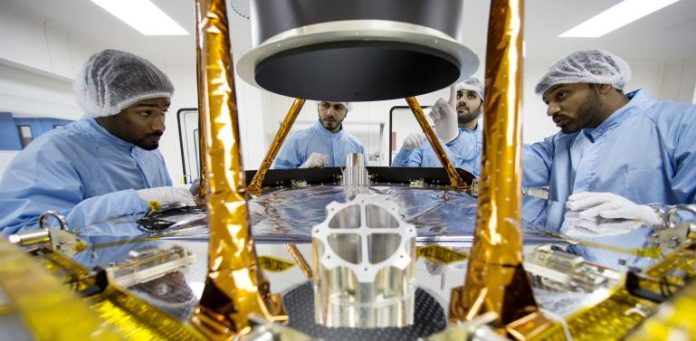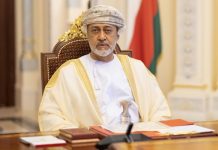MBRSC announced the final design completion of the KhalifaSat Engineering Model in addition to the software and systems within the satellite (Critical Design Review). The significance of this achievement is that it is the penultimate step prior to the manufacturing of the Flight Model of KhalifaSat, scheduled for launch in 2018 on MHI’s H-IIA launch vehicle, which is owned by ‘Mitsubishi Heavy Industries’. Emirati engineers will also commence the development of the ground station programs that will manage all post launch communication with the satellite.
H.E. Yousuf Hamad Al Shaibani, Director General, MBRSC, stated, “the completion of the final design of the engineering model by the KhalifaSat team is a major milestone, not only in developing this satellite but it is an achievement for the entire satellite manufacturing sector in the UAE. The success of Emirati engineers in leading and executing this project is a testament to the skills they gained from the previous two projects, especially since KhalifaSat is the first practical step in manufacturing an Emirati satellite built by Emirati expertise in Space Technology Laboratories in Dubai”.
“Under the support and guidance of our wise leadership and access to the right resources, the satellite manufacturing sector continues to grow in the UAE in line with the highest world-class standards and practices to enhance levels of production and competiveness. All these efforts culminated in the realization of the sectors’ strategic goals and future vision to play an active part in the enhancement of a sustainable local economy, building advanced scientific abilities and a world-class infrastructure to achieve a unique and leading position stemming from our leadership’s vision,” added Al Shaibani.
“Under the leadership and direction of His Highness Sheikh Hamdan bin Mohammed bin Rashid Al Maktoum, Crown Prince of Dubai and Chairman of MBRSC and General Supervisor of all the Centre’s projects, strategic and development plans, we are confident that MBRSC is taking definitive steps towards laying strong foundations to enhance the UAE space sector’s competitiveness on regional and global levels, in a manner that accelerates Dubai and UAE’s leading position in the space industry,” he concluded.
It merits mention that the team presented all the designs to MBRSC’s Internal Review Board comprised of systems engineers, managers and consultants, who discussed all the aspects and details related to the final design of the engineering model of KhalifaSat and its systems.
Amer Al Sayegh, Director of the Space Systems Development Department at MBRSC and KhalifaSat Project Manager said that the KhalifaSat team, which is composed of 68 Emirati engineers, made great efforts throughout the stages of developing the model and that they arrived at this advanced stage of development after over a year of collective efforts in designing the satellite’s different modules and sub-systems, as well as the prototype mechanical unit and completion of various system and design tests. He also noted that the coming stage is extremely dependent upon what has been achieved so far.
Al Sayegh highlighted, “what made this stage of development special in comparison, was the passion demonstrated by the engineers to innovate and enhance the satellite to make it one of the world’s best remote sensing satellites”.
“We are proud of what we achieved thus far, yet we are even prouder that a large number of Emirati youth had the opportunity to experience the field of satellite manufacturing and technologies. Over the past year, the number of Emirati engineers working on this project increased by 50 per cent, which is a positive indicator of MBRSC’s success in attracting Emirati capabilities. We hope to see this number increasing in the near future,” said Al Sayegh with pride.
The KhalifaSat project includes seven space innovations ranging from enhancements to a digital camera with an enhanced light meter for better image resolution, developing techniques to increase image download and communication speed with the satellite anywhere in the world. Further enhancements include the development of satellite positioning techniques that allow capturing a higher number of 3D images, target positioning system which makes the satellite one of the best satellites in the world that provide high-quality images, with high-speed response and an accurate location system. KhalifaSat innovations also include the development of an automatic satellite control system through upgrading the primary satellite computer’s operating system and increasing its storage capacity.






